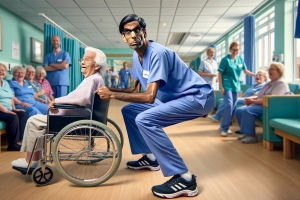Support migrant centric journalism today and donate

By Sanwar Ali:
The UK's adult social care sector is facing a severe shortage of staff, and many care providers are turning to overseas recruitment to fill the gap. Over two-thirds of health and care visas under the Skilled Worker visa scheme are for care workers. This guide provides a detailed overview of obtaining a sponsor licence for care workers, a critical requirement for UK businesses seeking to hire and sponsor foreign workers.
Introduction
Care providers looking to recruit overseas workers must first secure a sponsor licence. This licence is issued by the UK Home Office and is a prerequisite for sponsoring overseas care workers under the Health and Care Worker route. The guide covers the process for obtaining a sponsor license, the advantages of the Health and Care Worker visa, and the overall landscape of hiring foreign workers in the healthcare industry.
Understanding the Health and Care Worker Visa
The Health and Care Worker visa, part of the Skilled Worker visa route, was introduced in August 2020. This visa enables medical professionals and other staff to work in the UK in eligible roles within the NHS, an NHS supplier, or in adult social care.
Benefits of the Health and Care Worker Visa
The Health and Care Worker visa provides several advantages:
- Fast-track visa processing: The visa application process is expedited for entry into the UK.
- Dedicated UKVI support: Applicants and their dependents receive support from a dedicated UK Visas and Immigration (UKVI) team.
- Reduced visa fees: The visa fees for this route are lower compared to other Skilled Worker visas.
- Exemption from the Immigration Health Surcharge (IHS): Applicants are exempt from the IHS, a significant saving compared to other visa categories.
Temporary Visa Provisions for Care Workers
In response to the growing pressure on the adult social care sector, the UK government introduced temporary changes to immigration policy in February 2022. These changes made care workers and home carers eligible for the Skilled Worker route for an initial 12-month period and added these roles to the Shortage Occupation List (SOL). There are currently no plans to remove care workers from the Shortage Occupation List.
The Sponsor Licence: A Prerequisite for Hiring Overseas Staff
Any business wishing to hire overseas workers in the UK who need to be sponsored must first obtain a sponsor licence from the Home Office.
Steps to Apply for a Sponsor Licence
The application process for a sponsor licence involves three steps:
- Online application: The business must complete an online application form, send essential documents and additional information. The decision typically takes 8-10 weeks. If the Home Office conducts a compliance visit, the waiting time may increase. In some cases it may be able to obtain a decision within ten working days with the pre-licence priority service.
- Certificate of Sponsorship: Once the licence is granted, the business needs a 'Certificate of Sponsorship' (CoS) for each overseas workers. The employer assigns a CoS for each health and care worker, which has relevant information about the role and the employee.
- Visa Application: Finally, the recruit must apply for a Health and Social Care visa using the CoS. The applicant must meet the English language requirements.
Responsibilities of a Licensed Sponsor
Obtaining a sponsor license means employers have a significant responsibility to assist with immigration enforcement. The employer has various responsibilities, including appointing key personnel for the sponsor licence, carrying out right-to-work checks, keeping accurate records of sponsored worker absences, and reporting to the Home Office certain changes to a sponsored worker's job role or if sponsorship ceases for any reason.
The Importance of the Shortage Occupation List (SOL)
The inclusion of care workers and senior care workers on the SOL is a recognition from the UK Government of the staffing shortages currently afflicting the care sector. Being on the SOL allows sponsors to pay care workers a lower minimum salary than other roles.
Navigating the Minimum Salary Requirements
Generally, care workers and senior care workers must be paid a minimum of £20,960 gross per annum, and £10.75 gross per hour.
Job Advertising for Care Sector Roles
While care providers and others sponsoring overseas workers no longer need to meet the Resident Labour Market Test, and advertise the vacancies, it is probably a good idea to do so anyway. It's recommended to provide evidence of advertising with your licence application and retain that evidence for any potential Home Office inspection.
Is It Worth Becoming a Licensed Sponsor?
While becoming a licensed sponsor requires an initial investment of time, effort, and money, it can prove a worthwhile endeavour. Sponsorship can deliver in ways that domestic recruitment cannot, offering improved worker retention and access to a global talent pool.
Concluding Thoughts
Navigating the complexities of obtaining a sponsor licence for care workers can be challenging. However, with the right guidance and understanding of the process, care providers can successfully hire qualified overseas workers to meet their staffing needs. This comprehensive guide serves as a solid starting point for those embarking on this journey.
How Workpermit.com Can Help with Sponsor Licences
If you need help with employing Skilled Workers and help to apply for a Sponsor Licence, including complying with your Sponsor Licence obligations, HR responsibilities, etc Workpermit.com can help.
For more information and advice, please contact us at 0344 991 9222 or at london@workpermit.com(link sends e-mail)





















